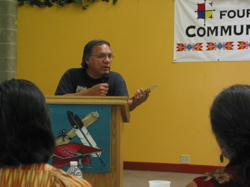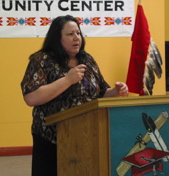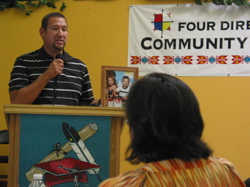"If you're having problems, they'll take your kids anytime they want," said Robert Wabasha, of the Santee Sioux Nation, whose granddaughter and grandniece both died after being adopted out of his family. The granddaughter died at the hands of her adoptive father while a baby, and the grandniece recently drowned at age 5. Wabasha (shown below) and other Native people testified about experiences with Iowa's child-welfare system before the Iowa Commission on Native American Affairs during a two-day meeting at Four Directions Community Center in Sioux City, Iowa.
 Fear and outrage permeated stories heard by ICNAA and other attendees, including attorneys, ICWA (Indian Child Welfare Act) specialists from the Ponca and Santee nations, and representatives of the governor, Siouxland Human Investment Partnership, and the Native American Unit of Iowa's human services department. "There's a feeling you're never safe," said commissioner and Four Directions program manager Judy Yellowbank, who's from the Winnebago Tribe of Nebraska. "Even people who have, for example, legally adopted a grandchild, can't be sure the child won't be taken away."
Fear and outrage permeated stories heard by ICNAA and other attendees, including attorneys, ICWA (Indian Child Welfare Act) specialists from the Ponca and Santee nations, and representatives of the governor, Siouxland Human Investment Partnership, and the Native American Unit of Iowa's human services department. "There's a feeling you're never safe," said commissioner and Four Directions program manager Judy Yellowbank, who's from the Winnebago Tribe of Nebraska. "Even people who have, for example, legally adopted a grandchild, can't be sure the child won't be taken away."
Preston Daniels, director of Iowa's human rights department, under whose umbrella ICNAA operates, addressed Native parents' sense of dread, saying, "Helplessness is terrifying." He also commended ICNAA's proposed solutions, including a bill to be introduced in the state legislature's 2011 spring session to restore parental rights to those who have lost them -- currently a permanent loss -- and to ensure grandparents' rights.
Daniels called the bill vital: "The relatively small Native population is in danger of losing its next generation, and therefore its heritage. Many are losing parental rights at a young age. However, every study shows that people generally mature out of youthful indiscretions at around age 25." They should have a second chance, Daniels said. "Children need their parents."
And parents need their children, said Four Directions' executive director Frank LaMere, from the Winnebago Tribe of Nebraska. He recounted the suicide of a young woman who'd lost custody of her child and added, "Our Anishinabe relatives tell us children choose their parents when they come into this world. A parental-rights bill would sustain those relationships."
In an afternoon of testimonials, speakers described leaping through what Rosalie Two Bulls, from Ho-Chunk Nation of Wisconsin, called "hoops of fire" to prove they were competent. Two Bulls, a mental-health professional working on a Ph.D., reported being told she is too old to adopt her grandchildren.
 Antonia Ybarra (shown right), also a Nebraska Winnebago, got certified as a foster parent to prove she was qualified to adopt her young relatives. Ybarra, who spoke at a 2009 Congressional briefing arranged by The Alliance for Racial Equity in Child Welfare, teared up as she explained that she had to divorce her husband of 23 years so his legal problems wouldn't prevent her from having the kids. "Even though the kids are legally adopted now, we're afraid to remarry until they turn 18," she said.
Antonia Ybarra (shown right), also a Nebraska Winnebago, got certified as a foster parent to prove she was qualified to adopt her young relatives. Ybarra, who spoke at a 2009 Congressional briefing arranged by The Alliance for Racial Equity in Child Welfare, teared up as she explained that she had to divorce her husband of 23 years so his legal problems wouldn't prevent her from having the kids. "Even though the kids are legally adopted now, we're afraid to remarry until they turn 18," she said.
Though the child-welfare system appears efficient at removing Native children, it seems ineffective when help may be needed. Reginald White, from the Red Lake Band of Chippewa, testified to the commission about roadblocks and hostility he was experiencing as he attempted to gain custody of his young son. "He's such a great, outgoing kid, but I'm seeing changes in him," White said. "He keeps asking me, 'Dad, when am I going home?'"
 Tony Wood (shown left), who's Yankton/Winnebago, held up a photograph of his 3½-year-old twins. "My children have been missing for 34 days, and I'm barely holding on," he said. "I believe they are in danger, and I believe I have fathers' rights, but no agency will help me. In recent months, I have been totally responsible for their needs. Now I don't know where they are or even if they're eating. I have a good job and supervise a staff, and my wife's lawyer is saying I can't see my kids because I'll take them and 'run to the reservation'."
Tony Wood (shown left), who's Yankton/Winnebago, held up a photograph of his 3½-year-old twins. "My children have been missing for 34 days, and I'm barely holding on," he said. "I believe they are in danger, and I believe I have fathers' rights, but no agency will help me. In recent months, I have been totally responsible for their needs. Now I don't know where they are or even if they're eating. I have a good job and supervise a staff, and my wife's lawyer is saying I can't see my kids because I'll take them and 'run to the reservation'."
Misinformation, such as the idea that reservations are beyond the law, poor understanding of Native cultures, and uncooperative court officials complicate matters in overburdened child-welfare systems. An area newspaper's investigative report and anecdotal evidence from Sioux City attorneys have also suggested that adoptions may be a lucrative business there. And some officials may not realize how aggressively they must pursue ICWA requirements, using "active efforts" to keep Native families together, to find a child's tribe, and more.
Moving forward, ICNAA will develop cultural-competency training, work to ensure better home studies, and encourage recruitment of Native foster families. Commission chair Judy Allen, from the Ponca Tribe of Nebraska, was adamant: "In working with the system, we don't want to turn our Native families into white families and our kids into white kids."
Photos by Stephanie Woodard.
Our 2024 Coverage Needs You
It's Another Trump-Biden Showdown — And We Need Your Help
The Future Of Democracy Is At Stake
Our 2024 Coverage Needs You
Your Loyalty Means The World To Us
As Americans head to the polls in 2024, the very future of our country is at stake. At HuffPost, we believe that a free press is critical to creating well-informed voters. That's why our journalism is free for everyone, even though other newsrooms retreat behind expensive paywalls.
Our journalists will continue to cover the twists and turns during this historic presidential election. With your help, we'll bring you hard-hitting investigations, well-researched analysis and timely takes you can't find elsewhere. Reporting in this current political climate is a responsibility we do not take lightly, and we thank you for your support.
Contribute as little as $2 to keep our news free for all.
Can't afford to donate? Support HuffPost by creating a free account and log in while you read.
The 2024 election is heating up, and women's rights, health care, voting rights, and the very future of democracy are all at stake. Donald Trump will face Joe Biden in the most consequential vote of our time. And HuffPost will be there, covering every twist and turn. America's future hangs in the balance. Would you consider contributing to support our journalism and keep it free for all during this critical season?
HuffPost believes news should be accessible to everyone, regardless of their ability to pay for it. We rely on readers like you to help fund our work. Any contribution you can make — even as little as $2 — goes directly toward supporting the impactful journalism that we will continue to produce this year. Thank you for being part of our story.
Can't afford to donate? Support HuffPost by creating a free account and log in while you read.
It's official: Donald Trump will face Joe Biden this fall in the presidential election. As we face the most consequential presidential election of our time, HuffPost is committed to bringing you up-to-date, accurate news about the 2024 race. While other outlets have retreated behind paywalls, you can trust our news will stay free.
But we can't do it without your help. Reader funding is one of the key ways we support our newsroom. Would you consider making a donation to help fund our news during this critical time? Your contributions are vital to supporting a free press.
Contribute as little as $2 to keep our journalism free and accessible to all.
Can't afford to donate? Support HuffPost by creating a free account and log in while you read.
As Americans head to the polls in 2024, the very future of our country is at stake. At HuffPost, we believe that a free press is critical to creating well-informed voters. That's why our journalism is free for everyone, even though other newsrooms retreat behind expensive paywalls.
Our journalists will continue to cover the twists and turns during this historic presidential election. With your help, we'll bring you hard-hitting investigations, well-researched analysis and timely takes you can't find elsewhere. Reporting in this current political climate is a responsibility we do not take lightly, and we thank you for your support.
Contribute as little as $2 to keep our news free for all.
Can't afford to donate? Support HuffPost by creating a free account and log in while you read.
Dear HuffPost Reader
Thank you for your past contribution to HuffPost. We are sincerely grateful for readers like you who help us ensure that we can keep our journalism free for everyone.
The stakes are high this year, and our 2024 coverage could use continued support. Would you consider becoming a regular HuffPost contributor?
Dear HuffPost Reader
Thank you for your past contribution to HuffPost. We are sincerely grateful for readers like you who help us ensure that we can keep our journalism free for everyone.
The stakes are high this year, and our 2024 coverage could use continued support. If circumstances have changed since you last contributed, we hope you'll consider contributing to HuffPost once more.
Already contributed? Log in to hide these messages.


 Antonia Ybarra (shown right), also a Nebraska Winnebago, got certified as a foster parent to prove she was qualified to adopt her young relatives. Ybarra, who spoke at a 2009 Congressional briefing arranged by The Alliance for Racial Equity in Child Welfare, teared up as she explained that she had to divorce her husband of 23 years so his legal problems wouldn't prevent her from having the kids. "Even though the kids are legally adopted now, we're afraid to remarry until they turn 18," she said.
Antonia Ybarra (shown right), also a Nebraska Winnebago, got certified as a foster parent to prove she was qualified to adopt her young relatives. Ybarra, who spoke at a 2009 Congressional briefing arranged by The Alliance for Racial Equity in Child Welfare, teared up as she explained that she had to divorce her husband of 23 years so his legal problems wouldn't prevent her from having the kids. "Even though the kids are legally adopted now, we're afraid to remarry until they turn 18," she said.